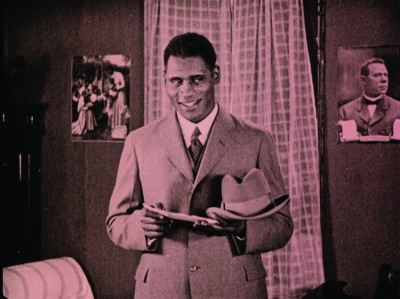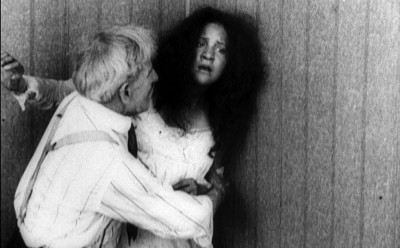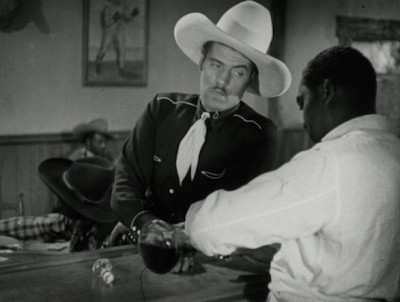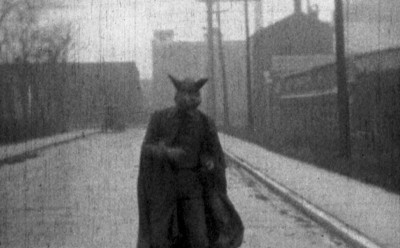| Reviews & Columns |
|
Reviews DVD TV on DVD Blu-ray 4K UHD International DVDs In Theaters Reviews by Studio Video Games Features Collector Series DVDs Easter Egg Database Interviews DVD Talk Radio Feature Articles Columns Anime Talk DVD Savant Horror DVDs The M.O.D. Squad Art House HD Talk Silent DVD
|
DVD Talk Forum |
|
|
| Resources |
|
DVD Price Search Customer Service #'s RCE Info Links |
|
Columns
|
|
|
Pioneers of African American Cinema
Kino // Unrated // July 26, 2016
List Price: $99.95 [Buy now and save at Amazon]
The Movies:
One area of film history that is rarely discussed is the 'race films' that were written, directed, produced, and starred people of color and were intended to be seen, not in the big movie palaces, but is small cinemas that served a largely black clientele. Being all but banned from a film career with the big Hollywood studios due to the color of their skin, a small but important group of people started making films on their own telling their own stories. Independent productions with miniscule budgets these movies were largely ignored after their brief theatrical run and largely forgotten. Even books on the history of American movies outside of the studio system rarely mention these films and if they do it is often no more than a page or two.

Kino has gone a long way to rectify that problem with their release of Pioneers of African American Cinema. This massive five-disc set is the result of a successful Kickstarter campaign and it is filled to the brim with rare shorts, fragments and feature films that were created by African-Americans. Starting in 1915 and going through the early 1940's this set not only gives film buffs a chance to see what movies African-Americans were making, but also to see what they had to say about their society.
One of the most influential figures in African-American cinema from this time is the writer/director/producer Oscar Micheaux. He made over 40 films during his career, some of them lost, and he is well represented in this collection. There are nine Micheaux features in this collection including Within Our Gates from 1920, the oldest surviving movie created by an African-American. This is an interesting film because Micheaux contrasts black life in the Deep South as well as in the industrialized North, as well as giving his answer to the question of what people of color can do to better their lot in life: become educated. This movie also examines some of the many problems facing minorities in the US at the time: poor schools, lynching, being cheated in business deals, and systematic racism.
The story revolves around a young woman named Sylvia Landry (Evelyn Preer), a teacher at a school for black children in the South who has traveled up North to try to secure funds to keep the school running. On her travels she meets a handsome and successful African-American lawyer, as well as a kind white woman who is contemplating a donation. To this backdrop the rest of the story is pinned: Sylvia's romantic interests (past and present), the story of the school, Sylvia's history as the adopted daughter of a sharecropped, a murder, attempted rape, and crooked ministers.

One of the films strengths is that it does not paint all of the white people as evil and all of the black people as good. There is a lot of crossover, from the gentle Anglo woman to the black crooks and thugs. There is also an African-American preacher who tells his congregation that they will be rewarded in the next life, and not to cause trouble in this one... because he is paid to by a group of white businessman.
While there is no denying that Within Our Gates is an important film for these reasons, it is also a hard movie to watch. Oscar Micheaux was not trained in Hollywood nor did he have the chance to go to film school. The same goes for the cast and the crew. Because of this, the movie has a lot of problems, especially the script with is messy and convoluted. There are flashbacks inside of flashbacks, character come and go seemingly at random, and just when you think you've got a handle on the plot, the story veers off in another direction, introducing a whole new set of characters and problems. It's fairly clear that Micheaux wanted to put all of his ideas in this one film, even if they didn't really belong together.
Having a disjointed plot and a weak script is something that crops up several times in this set. Another film that falls into this trap is Eleven P.M. by Richard Maurice from 1928. It tells the story of a street violin player named Sundaisy (played by the director) who, for reasons that aren't especially clear, encounters a dying crook and promises the man that he will ensure that his son gets a good education. A dozen years pass. Though the money Sundaisy received from the crook was immediately stolen, he eventually tries to fulfill the dying man's wish and tracks the son down to a small soup kitchen where he works for meals. While at the restaurant he meets June (Orine Johnson) an attractive waitress. When June pushes away a customer who grabs her, she's fired for being too uppity. So she decides to go along with Sundaisy and the youth, apparently having nothing better to do. The trio ends up at house where they meet a minister who promises to educate the boy, and marries Sundaisy and June while he's there. After all, they've known each other for a good 15 minutes by this time. Except the minister is actually a con man and teaches the boy how to be a crook... another 12 years pass and then the story gets very weird.

That's not to say that all of the films are disjointed or head-scratching... that's not the case at all. Many of them are straight dramas like The Flying Ace from 1928 directed by Richard E. Norman which is a crime drama featuring a pilot as the detective. Likewise, The Bronze Buckaroo is a typical western, involving a group looking for their missing friend out in the old west. This one also has an amusing running gag about a 'talking mule' and the cowboy who buys such a find for $12. (The cowboy proudly tells his friend that the mule speaks English! The man had another one but it only spoke German.) The nice thing is that the gag actually turns into a plot point near the end.
One of the great things about just about all of these films is that they feature African-Americans in roles that people, especially young ones, can look up to: They are lawyers, doctors, educators, pilots, and even cowboys. Who wouldn't want to be Hollywood's version of a cowboy? The creators of these films, though they are generally rough and unpolished, were trying to show their race what they could aspire to be. And it is great that these films have withstood the ravages of time and are still with us.

The films included in this set are:
Disc One (Total Running Time 282 minutes):
Two Knights of Vaudeville Ebony Film Co., 1915. 11 minutes. Music by Donald Sosin
Mercy the Mummy Mumbled Ebony Film Co., 1918. 12 minutes. Music by the Alloy Orchestra.
A Reckless Rover Ebony Film Co., 1918. 14 minutes. Music by Donald Sosin.
Within Our Gates Oscar Micheaux, 1920. 73 minutes. Music by DJ Spooky.
The Symbol of the Unconquered: A Story of the KKK Oscar Micheaux, 1920. 59 minutes. Music by Max Roach.
By Right of Birth Lincoln Motion Picture Co., 1921. 4 minutes. Music by Donald Sosin.
Body and Soul Oscar Micheaux, 1925. 93 minutes. Music by DJ Spooky.
Disc Two (Total Running Time - 259 minutes):
Regeneration Richard E. Norman, 1923. 11 minutes. Music by Donald Sosin.
The Flying Ace Richard E. Norman, 1928. 65 minutes. Music by Mont Alto Motion Picture Orchestra.
Ten Nights in a Bar Room CPFC, 1926. 64 minutes. Music by Donald Sosin.
Rev. S.S. Jones Home Movies Rev. Solomon Sir Jones, 1924-1926. 16 minutes. Music by Andrew Simpson.
The Scar of Shame Frank Peregini, 1929. 86 minutes. Music by Makia Matsumura
Disc Three (Total Running Time - 253 minutes):
Eleven P.M. Richard Maurice, 1928. 60 minutes. Music by Rob Gal.
Hell-Bound Train James and Eloyce Gist, 1930. 50 minutes. Restored by S. Torriano Berry. Music by Samuel Waymon.
Verdict Not Guilty James and Eloyce Gist, 1934. 8 minutes. Restored by S. Torriano Berry. Music by Samuel Waymon.
Heaven-Bound Travels (BLU-RAY ONLY) James and Eloyce Gist, 1935. 15 minutes. Restored by S. Torriano Berry. Music by Samuel Waymon.
The Darktown Revue Oscar Micheaux, 1931. 18 minutes.
The Exile Oscar Micheaux, 1931. 78 minutes.
Hot Biskits Spencer Williams, 1931. 10 minutes.
Disc Four (Total Running Time - 272 minutes):
The Girl from Chicago Oscar Micheaux, 1932. 70 minutes.
Ten Minutes to Live Oscar Micheaux, 1932. 58 minutes.
Veiled Aristocrats Oscar Micheaux, 1932. 48 minutes.
Birthright Oscar Micheaux, 1938. 73 minutes.
Disc Five (Total Running Time - 243 minutes):
The Bronze Buckaroo Richard Kahn, 1939. 58 minutes.
Zora Neale Hurston Fieldwork Footage (excerpt) Zora Neale Hurtston, 1928. 3 minutes.
Commandment Keeper Church, Beaufort South Carolina, May 1940 (excerpt) Zora Neale Hurston, 1940. 15 minutes.
The Blood of Jesus Spencer Williams, 1941. 56 minutes.
Dirty Gertie from Harlem U.S.A. Spencer Williams, 1946. 60 minutes.
Moses Sisters Interview Pearl Bowser, 1978. 32 minutes.
This collection of nineteen features and many shorts films runs over 21-hours all together. They arrive on five discs that are housed in a fold-out sleeve with a slipcase, rather than individual cases.
Video:
These films were not cherished and preserved like some of their Studio cousins. There's even a short bonus about the discovery of a nitrate film collection in an old warehouse in Texas in the 1980's. While a couple of the films look excellent, even the restored films will have some problems, be it scratches and dirt or slight nitrate decomposition. Some come from dubs, and are lacking a bit of definition that an original would have, but generally these look fine. They are all definitely watchable and in many cases look much better than they should.
Audio:
The films from the sound era arrive with their original mono soundtracks intact, and while showing the limits of the technology of the time, are fine. The silent movies all have accompaniment from a variety of musicians, from the solo piano by Donald Sosin to larger group like the Mont Alto Motion Picture Orchestra. With only a couple of exceptions the accompaniment was excellent with the music fitting well to the action on the screen. The times I didn't enjoy the music were always when the producers were trying something new and different, like the electric guitar accompaniment to Eleven P.M. While I didn't care for it, I can't get too upset that they attempted an experiment that didn't work.
Extras:
There are several short video featurettes scattered across the discs. These include:
An Introduction (7 minutes)
The Films of Oscar Micheaux (8 minutes)
The Color Line (5 minutes)
Ten Nights in a Bar Room - An Introduction (4 minutes)
About the Restoration (8 minutes)
Veiled Aristocrats Trailer (4 minutes)
Birthright Trailer (4 minutes)
We Work Again - WPA Documentary (1937, 15 minutes)
Texas Tyler Promo Film with Ossie Davis (1985, 6 minutes)
The Films of Zora Neale Hurston (2 minutes)
The Films of Spencer Williams (7 minutes)
The End of an Era (4 minutes)
While these were all very interesting, the real exciting bonus item is packed in with the set: an 80-page book featuring essays by noted historians. There are also stills and some great images of one-sheets and other advertisements touting the films included on this set. A great read!
Final Thoughts:
This is a great collection. While these independent low-budget films may lack the slick appearance of Hollywood's output they are a nearly forgotten chapter in film history as well as African-American culture. Highly Recommended.
One area of film history that is rarely discussed is the 'race films' that were written, directed, produced, and starred people of color and were intended to be seen, not in the big movie palaces, but is small cinemas that served a largely black clientele. Being all but banned from a film career with the big Hollywood studios due to the color of their skin, a small but important group of people started making films on their own telling their own stories. Independent productions with miniscule budgets these movies were largely ignored after their brief theatrical run and largely forgotten. Even books on the history of American movies outside of the studio system rarely mention these films and if they do it is often no more than a page or two.

One of the most influential figures in African-American cinema from this time is the writer/director/producer Oscar Micheaux. He made over 40 films during his career, some of them lost, and he is well represented in this collection. There are nine Micheaux features in this collection including Within Our Gates from 1920, the oldest surviving movie created by an African-American. This is an interesting film because Micheaux contrasts black life in the Deep South as well as in the industrialized North, as well as giving his answer to the question of what people of color can do to better their lot in life: become educated. This movie also examines some of the many problems facing minorities in the US at the time: poor schools, lynching, being cheated in business deals, and systematic racism.
The story revolves around a young woman named Sylvia Landry (Evelyn Preer), a teacher at a school for black children in the South who has traveled up North to try to secure funds to keep the school running. On her travels she meets a handsome and successful African-American lawyer, as well as a kind white woman who is contemplating a donation. To this backdrop the rest of the story is pinned: Sylvia's romantic interests (past and present), the story of the school, Sylvia's history as the adopted daughter of a sharecropped, a murder, attempted rape, and crooked ministers.

One of the films strengths is that it does not paint all of the white people as evil and all of the black people as good. There is a lot of crossover, from the gentle Anglo woman to the black crooks and thugs. There is also an African-American preacher who tells his congregation that they will be rewarded in the next life, and not to cause trouble in this one... because he is paid to by a group of white businessman.
While there is no denying that Within Our Gates is an important film for these reasons, it is also a hard movie to watch. Oscar Micheaux was not trained in Hollywood nor did he have the chance to go to film school. The same goes for the cast and the crew. Because of this, the movie has a lot of problems, especially the script with is messy and convoluted. There are flashbacks inside of flashbacks, character come and go seemingly at random, and just when you think you've got a handle on the plot, the story veers off in another direction, introducing a whole new set of characters and problems. It's fairly clear that Micheaux wanted to put all of his ideas in this one film, even if they didn't really belong together.
Having a disjointed plot and a weak script is something that crops up several times in this set. Another film that falls into this trap is Eleven P.M. by Richard Maurice from 1928. It tells the story of a street violin player named Sundaisy (played by the director) who, for reasons that aren't especially clear, encounters a dying crook and promises the man that he will ensure that his son gets a good education. A dozen years pass. Though the money Sundaisy received from the crook was immediately stolen, he eventually tries to fulfill the dying man's wish and tracks the son down to a small soup kitchen where he works for meals. While at the restaurant he meets June (Orine Johnson) an attractive waitress. When June pushes away a customer who grabs her, she's fired for being too uppity. So she decides to go along with Sundaisy and the youth, apparently having nothing better to do. The trio ends up at house where they meet a minister who promises to educate the boy, and marries Sundaisy and June while he's there. After all, they've known each other for a good 15 minutes by this time. Except the minister is actually a con man and teaches the boy how to be a crook... another 12 years pass and then the story gets very weird.

One of the great things about just about all of these films is that they feature African-Americans in roles that people, especially young ones, can look up to: They are lawyers, doctors, educators, pilots, and even cowboys. Who wouldn't want to be Hollywood's version of a cowboy? The creators of these films, though they are generally rough and unpolished, were trying to show their race what they could aspire to be. And it is great that these films have withstood the ravages of time and are still with us.

The films included in this set are:
Disc One (Total Running Time 282 minutes):
Two Knights of Vaudeville Ebony Film Co., 1915. 11 minutes. Music by Donald Sosin
Mercy the Mummy Mumbled Ebony Film Co., 1918. 12 minutes. Music by the Alloy Orchestra.
A Reckless Rover Ebony Film Co., 1918. 14 minutes. Music by Donald Sosin.
Within Our Gates Oscar Micheaux, 1920. 73 minutes. Music by DJ Spooky.
The Symbol of the Unconquered: A Story of the KKK Oscar Micheaux, 1920. 59 minutes. Music by Max Roach.
By Right of Birth Lincoln Motion Picture Co., 1921. 4 minutes. Music by Donald Sosin.
Body and Soul Oscar Micheaux, 1925. 93 minutes. Music by DJ Spooky.
Disc Two (Total Running Time - 259 minutes):
Regeneration Richard E. Norman, 1923. 11 minutes. Music by Donald Sosin.
The Flying Ace Richard E. Norman, 1928. 65 minutes. Music by Mont Alto Motion Picture Orchestra.
Ten Nights in a Bar Room CPFC, 1926. 64 minutes. Music by Donald Sosin.
Rev. S.S. Jones Home Movies Rev. Solomon Sir Jones, 1924-1926. 16 minutes. Music by Andrew Simpson.
The Scar of Shame Frank Peregini, 1929. 86 minutes. Music by Makia Matsumura
Disc Three (Total Running Time - 253 minutes):
Eleven P.M. Richard Maurice, 1928. 60 minutes. Music by Rob Gal.
Hell-Bound Train James and Eloyce Gist, 1930. 50 minutes. Restored by S. Torriano Berry. Music by Samuel Waymon.
Verdict Not Guilty James and Eloyce Gist, 1934. 8 minutes. Restored by S. Torriano Berry. Music by Samuel Waymon.
Heaven-Bound Travels (BLU-RAY ONLY) James and Eloyce Gist, 1935. 15 minutes. Restored by S. Torriano Berry. Music by Samuel Waymon.
The Darktown Revue Oscar Micheaux, 1931. 18 minutes.
The Exile Oscar Micheaux, 1931. 78 minutes.
Hot Biskits Spencer Williams, 1931. 10 minutes.
Disc Four (Total Running Time - 272 minutes):
The Girl from Chicago Oscar Micheaux, 1932. 70 minutes.
Ten Minutes to Live Oscar Micheaux, 1932. 58 minutes.
Veiled Aristocrats Oscar Micheaux, 1932. 48 minutes.
Birthright Oscar Micheaux, 1938. 73 minutes.
Disc Five (Total Running Time - 243 minutes):
The Bronze Buckaroo Richard Kahn, 1939. 58 minutes.
Zora Neale Hurston Fieldwork Footage (excerpt) Zora Neale Hurtston, 1928. 3 minutes.
Commandment Keeper Church, Beaufort South Carolina, May 1940 (excerpt) Zora Neale Hurston, 1940. 15 minutes.
The Blood of Jesus Spencer Williams, 1941. 56 minutes.
Dirty Gertie from Harlem U.S.A. Spencer Williams, 1946. 60 minutes.
Moses Sisters Interview Pearl Bowser, 1978. 32 minutes.
The Blu-rays:
This collection of nineteen features and many shorts films runs over 21-hours all together. They arrive on five discs that are housed in a fold-out sleeve with a slipcase, rather than individual cases.
Video:
These films were not cherished and preserved like some of their Studio cousins. There's even a short bonus about the discovery of a nitrate film collection in an old warehouse in Texas in the 1980's. While a couple of the films look excellent, even the restored films will have some problems, be it scratches and dirt or slight nitrate decomposition. Some come from dubs, and are lacking a bit of definition that an original would have, but generally these look fine. They are all definitely watchable and in many cases look much better than they should.
Audio:
The films from the sound era arrive with their original mono soundtracks intact, and while showing the limits of the technology of the time, are fine. The silent movies all have accompaniment from a variety of musicians, from the solo piano by Donald Sosin to larger group like the Mont Alto Motion Picture Orchestra. With only a couple of exceptions the accompaniment was excellent with the music fitting well to the action on the screen. The times I didn't enjoy the music were always when the producers were trying something new and different, like the electric guitar accompaniment to Eleven P.M. While I didn't care for it, I can't get too upset that they attempted an experiment that didn't work.
Extras:
There are several short video featurettes scattered across the discs. These include:
An Introduction (7 minutes)
The Films of Oscar Micheaux (8 minutes)
The Color Line (5 minutes)
Ten Nights in a Bar Room - An Introduction (4 minutes)
About the Restoration (8 minutes)
Veiled Aristocrats Trailer (4 minutes)
Birthright Trailer (4 minutes)
We Work Again - WPA Documentary (1937, 15 minutes)
Texas Tyler Promo Film with Ossie Davis (1985, 6 minutes)
The Films of Zora Neale Hurston (2 minutes)
The Films of Spencer Williams (7 minutes)
The End of an Era (4 minutes)
While these were all very interesting, the real exciting bonus item is packed in with the set: an 80-page book featuring essays by noted historians. There are also stills and some great images of one-sheets and other advertisements touting the films included on this set. A great read!
Final Thoughts:
This is a great collection. While these independent low-budget films may lack the slick appearance of Hollywood's output they are a nearly forgotten chapter in film history as well as African-American culture. Highly Recommended.
|
| Popular Reviews |
| Sponsored Links |
|
|
| Sponsored Links |
|
|
| Release List | Reviews | Shop | Newsletter | Forum | DVD Giveaways | Blu-Ray | Advertise |
|
Copyright 2024 DVDTalk.com All Rights Reserved. Legal Info, Privacy Policy, Terms of Use,
Manage Preferences,
Your Privacy Choices | |||||||













